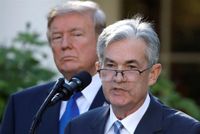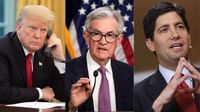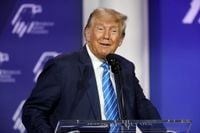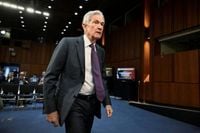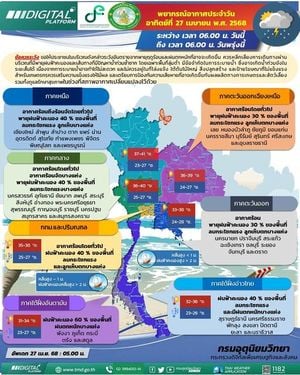President Donald Trump has been privately discussing the possibility of firing Federal Reserve Chair Jerome Powell for several months, a move that has raised eyebrows among economists and political analysts alike. According to a report from the Wall Street Journal published on April 17, 2025, Trump has had multiple conversations with former Federal Reserve Governor Kevin Warsh regarding the potential ousting of Powell, including the prospect of appointing Warsh as his replacement.
These discussions have reportedly intensified as Trump grows increasingly frustrated with Powell's reluctance to lower interest rates, a decision Trump believes is crucial for cushioning the U.S. economy amid rising tariff tensions with China. The president's agitation has been compounded by his recent decision to impose aggressive tariffs—up to 245%—on Chinese imports, which analysts are calling the most intense U.S.-China trade war in history.
Trump's conversations with Warsh took place at his Mar-a-Lago estate in Florida and in the Oval Office, with discussions continuing as recently as February 2025. Warsh has advised Trump against firing Powell, arguing that the Fed chair should be allowed to complete his term, which is set to expire in May 2026, without interference.
Despite Warsh's counsel, Trump appears undeterred. In a Truth Social post on the morning of April 17, he stated, "Powell's termination cannot come fast enough!" Later that day, he reinforced his displeasure during a press briefing, saying, "I'm not happy with him. I let him know it, and if I want him out, he'll be out of there real fast, believe me." This aggressive stance has raised concerns even among Powell's critics, including Senator Elizabeth Warren, who warned that undermining the Fed's independence could lead to catastrophic consequences for U.S. markets.
Furthermore, Trump's frustrations have been echoed by others close to him, who have also suggested that Powell should be removed. Discussions about firing Powell have reportedly occurred as recently as early March 2025, with some advisors arguing that the law isn't strong enough to protect Powell's position if Trump decides to push for Warsh's appointment.
Warsh, who served during the 2008 financial crisis and was a finalist for the Fed chair position when Trump initially appointed Powell, has given the impression that the Fed job was all but offered to him once Powell's term ends. However, he has consistently advised against any premature actions that could destabilize the financial markets.
The implications of Trump's threats have already begun to ripple through the markets. Following the news of his discussions about Powell, Bitcoin dipped below the $85,300 mark, trading at approximately $84,775.65 shortly after the report circulated. This immediate market reaction highlights the potential volatility that could arise from any significant changes in the Federal Reserve's leadership.
In a historical context, the Fed has often been seen as an independent body, insulated from political pressures. However, Trump's ongoing public criticisms of Powell and the Fed's policies have sparked fears about the erosion of this independence. Six years ago, when similar rumblings about Powell's status surfaced, Fed leaders decided that if Powell's position were called into question, they would elect him to lead the Federal Open Market Committee (FOMC), which traditionally has the same person as the Fed chair but has the power to elect its own chair.
As Trump continues to express his dissatisfaction with Powell, the question remains: how far is he willing to go to assert his influence over the Federal Reserve? With Powell's term not set to expire until May 2026, the potential for a protracted battle over his position looms large, and the ramifications could extend beyond the walls of the White House and the Fed, affecting the broader economy and financial markets.
In conclusion, Trump's ongoing discussions about Powell's potential removal signal a significant moment in U.S. economic policy, as the president's frustrations with the Fed chair could lead to a pivotal shift in the central bank's direction. The interplay between political pressures and economic stability will be closely watched in the coming months, as both the administration and the financial markets navigate these turbulent waters.
